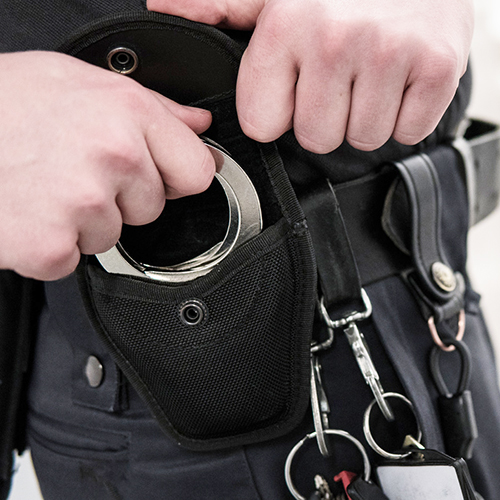Man unlawfully arrested when walking to work
At around 05:30hrs on the 18th September 2018, my client (Mr Jamie Looseley) was making his way from his house to Addlestone Train Station to begin his morning commute to work in London. Within a minute of leaving his house, a Police car from the Surrey Police Force pulled up next to Mr Looseley and the Police Officers inside the same approached him. Suddenly and without any sign of aggression or resistance and neither without any tactical communication from the attending Police Officers, Mr Looseley was grabbed and detained in handcuffs before he was searched as there was ‘25% chance’ that he was the person on the above-mentioned CCTV footage. It was confirmed to Mr Looseley that he was not under arrest at this point.
The said search was then completed which provided a negative result. As a result, the handcuffs were removed from Mr Looseley and he was allowed to leave. Mr Looseley then suggested that what he had been subjected to was disgusting. In response, Mr Looseley was grabbed again and he was arrested on suspicion of the burglary that Police Officers had moments before been satisfied that he had no involvement in. To quote the bodycam footage, ‘nick him on suspicion of burglary due to the CCTV and the black rucksack so there is reasonable enough suspicion to nick him’. There was no new information received by the attending Police Officers from the time Mr Looseley was allowed to leave until he was arrested.
Mr Looseley was then taken to Guildford Police Station without being handcuffed despite Addlestone Police Station being closer. Mr Looseley was then booked into custody and later interviewed. Within the said interview, Mr Looseley provided a full account which was exactly as he had stated at the point of initial contact with the attending Police Officers. After interview, Mr Looseley was released pending further investigation and later given no further action confirmation as there was sufficient evidence to prove that he was not involved in the said burglary.
Following this, Mr Looseley lodged a complaint to Surrey Police’s Professional Standards Department. As there was no response for a while, Mr Looseley then instructed Mr Matthew McConville from this firm to act for him as he is a specialist in actions against the police.
In response to his complaint, Mr Looseley’s complaint was largely dismissed save for it being upheld that an Inspector provided incorrect information about Mr Looseley to his girlfriend in regards to the offence that he was arrested for. Unfortunately, Mr Looseley was unable to lodge an appeal to this said complaint finding as the Force refused to provide the bodycam footage referred to within the said complaint response despite Mr Looseley being entitled to the same. As a result, Mr McConville lodged a complaint (which was upheld) by the Information Commissioner’s Office and after re-assessment of their position, the Police later provided the same to Mr Looseley for consideration.
Mr McConville then sent a Letter of Claim on behalf of Mr Looseley to Surrey Police’s Headquarters. The crux of Mr Looseley’s claim was the following:
- After the point he was grabbed, detained in handcuffs and told the reason for the same, Mr Loosley actually consented to a search of his person. It is clear that none of the attending Police Officers engaged in tactical communication to Mr Looseley about searching him voluntarily before this moment.
- The attending Police Officers were only ‘25% sure’ that Mr Looseley was involved which is not enough to reach the threshold of reasonable suspicion for an arrest. Further, the CCTV used to identify the assailant was black and white.
- Mr Looseley’s innocence is evidenced by the attending Police Officers’ negative search upon him and Mr Looseley’s later no further action. The attending Police Officers could have also telephoned Mr Looseley’s employer to corroborate that he was getting the train to work in London but they never did.
Essentially, it is clear that there were many options available to the attending Police Officers before resorting to grabbing Mr Looseley which were not engaged.
The reasons to arrest Mr Looseley as given by the attending Police Officers was to ‘allow the prompt and effective investigation’ and ‘prevent person causing loss or damage to property’. A prompt and effective investigation would have been to undertake the above-mentioned steps rather than resorting to arrest. Also, Mr Looseley had no property on his person connected to the said burglary (as proven by the negative search) so there was no risk a causing loss or damage to any property. If the attending Police Officers were maybe concerned about the same being located at Mr Looseley’s house, they could/should have asked Mr Looseley for consent to search the same as he was consensual with searching his person. In any event, the search of Mr Looseley’s house later also proved negative. Finally, Mr Looseley’s detention was authorised in order to secure and preserve evidence as well as obtain evidence by way of questioning. The securing and preservation of evidence could have been dealt with as above and the answers Mr Looseley gave in interview were as stated at the roadside so he could have equally have been either cautioned at the roadside in respect of the answers he gave or alternative invited for a voluntary interview of which Mr Looseley would have attended.
The heads of claim that Mr McConville presented to Surrey Police were Imprisonment (wrongful arrest), Assault (handcuffing as a result of an unlawful arrest) and a Data Protection action (disclosing information without consent and that information being inaccurate). Upon receipt of this, Surrey Police instructed representatives and they put forward an offer to settle Mr Looseley’s claim without admitting liability. After negotiations, Mr Looseley agreed to settle his claim for £4,500.00 rather than issuing Court proceedings so that he can attempt to now move on with his life.












